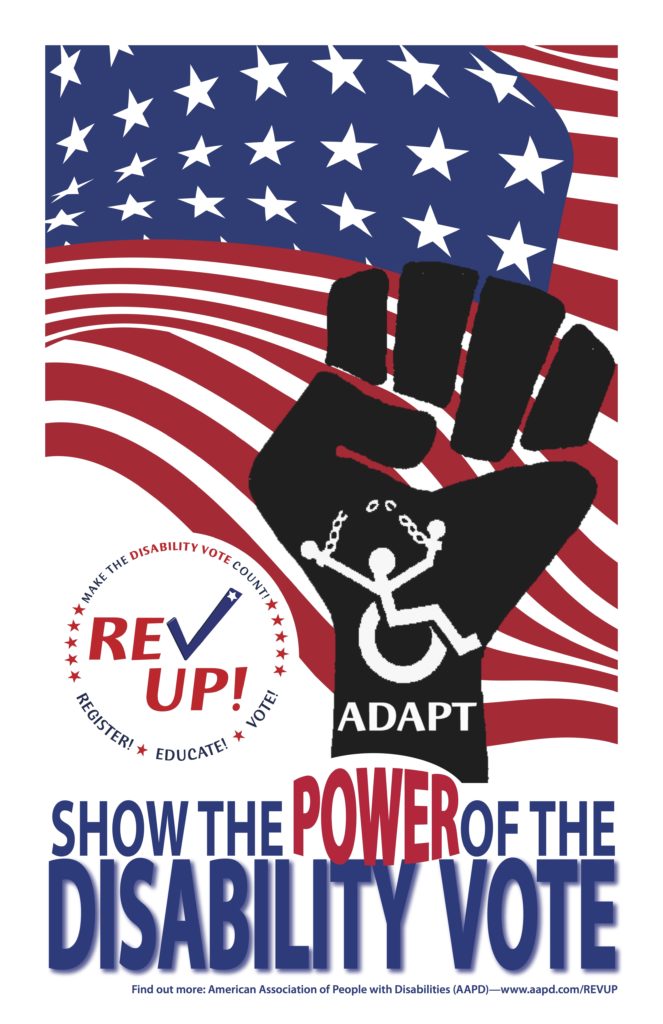American Baptist Home Mission Societies has joined more than 100 organizations and individuals encouraging political candidates to address disability concerns.
The Interfaith Disability Advocacy Coalition, a program of the American Association of People with Disabilities, is collecting signatures to an open letter to candidates from people of faith concerned about the civil rights of 56 million Americans living with a disability.
The letter is part of national campaign launched Feb. 23 to organize people with disabilities, family members, friends, advocates and other Americans into a “disability vote” bloc with clout on par with other special interest groups to be taken seriously by politicians.
Launched by the American Association of People with Disabilities, Texas Disability Project, Disability Rights Texas and other disability advocacy groups, the REV UP campaign is an effort to “make the disability vote count.” REV UP is an acronym for Register, Educate, Vote, Use, (your) Power.
The letter to candidates says Americans with disabilities make valuable contributions to their communities yet continue to face discrimination in many arenas including employment, transportation and education.
 More than 25 years after passage of the Americans with Disabilities Act — intended to give disabled Americans the same civil rights protections afforded to women and minorities under the 1964 Civil Rights Act — people with disabilities face poverty and unemployment rates twice the national average, the letter says.
More than 25 years after passage of the Americans with Disabilities Act — intended to give disabled Americans the same civil rights protections afforded to women and minorities under the 1964 Civil Rights Act — people with disabilities face poverty and unemployment rates twice the national average, the letter says.
That reflects “real discrimination,” the letter says, and urges candidates “to lay out a comprehensive agenda that addresses the civil rights of Americans with disabilities.”
“Candidates for public office must address these disparities and must set forth a vision to encourage the civil rights of people with disabilities and to promote their full inclusion in society,” the letter says. “This is imperative in light of the gifts and talents Americans with disabilities bring to their schools, jobs and faith communities.”
The letter urges candidates to support public policy to create jobs, increase access to affordable housing and transportation and remove barriers to education still facing Americans with a disability. It calls specifically for “continuation of reforms passed into law as part of the Affordable Care Act that help people with disabilities lead healthy lives and increase their access to long term services and supports, as well as support further expansion of mental health and substance use services.”
“We encourage you to share your positions on these issues and where these concerns fall in your priorities,” the letter to candidates concludes. “Furthermore, we urge you to invite persons with disabilities into the conversations concerning the best ways to expand both access and opportunity for all Americans.”
“We do not offer endorsement of specific candidates or parties, but we will share your efforts and actions on behalf of people with disabilities with our community,” the faith group letter says. “We encourage everyone to work towards the goal of ensuring that the American experiment of self-government increasingly includes and reflects the voices, concerns and wisdom of people with disabilities.”
“Faith communities have long encouraged their members to engage in responsible citizenship, including voting, and many serve as polling places on Election Day,” said Curtis Ramsey-Lucas, director of interfaith engagement for the American Association of People with Disabilities.
Through involvement in the REV UP campaign, Ramsey-Lucas said the Interfaith Disability Advocacy Coalition “seeks to build on these efforts by encouraging candidates for public office to make a greater effort to engage the concerns of the disability community.”
“It is our hope that in doing so, the American experiment of self-government increasingly includes and reflects the voices, concerns and wisdom of people with disabilities,” said Ramsey-Lucas, who also serves as managing director of resource development for American Baptist Home Mission Societies.
